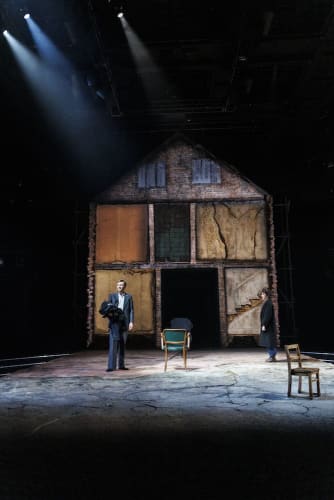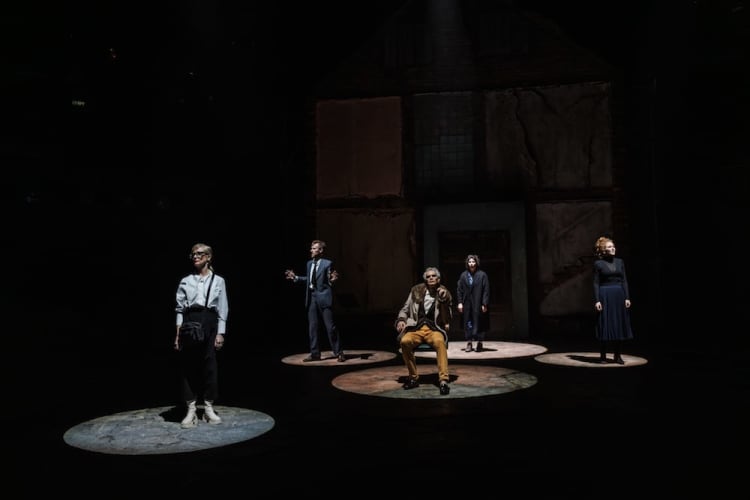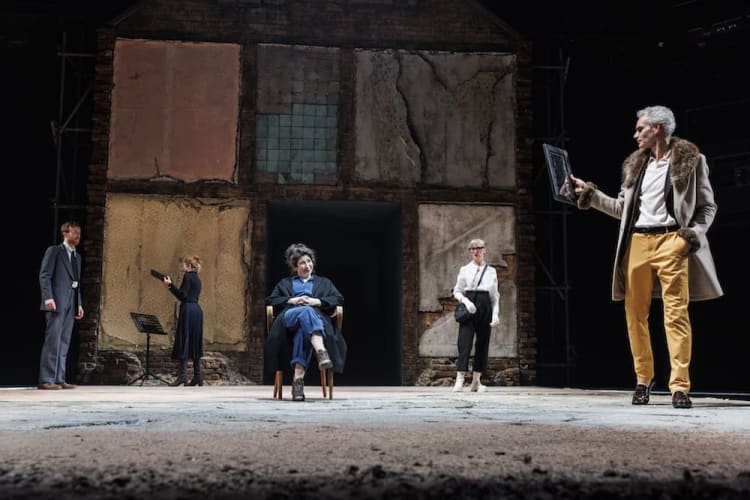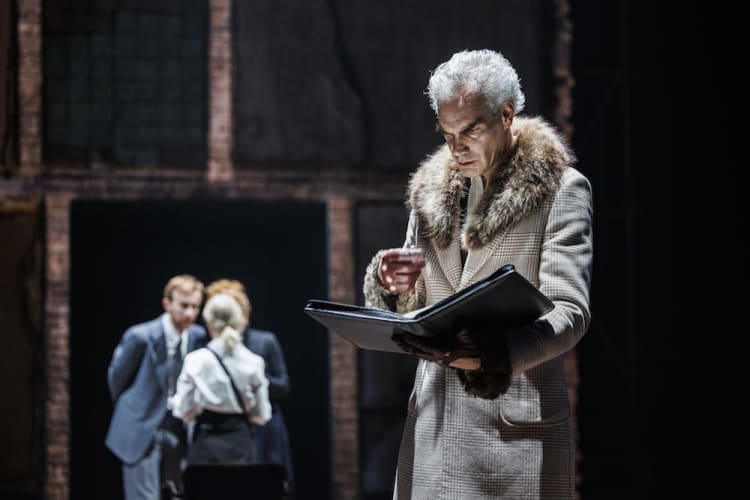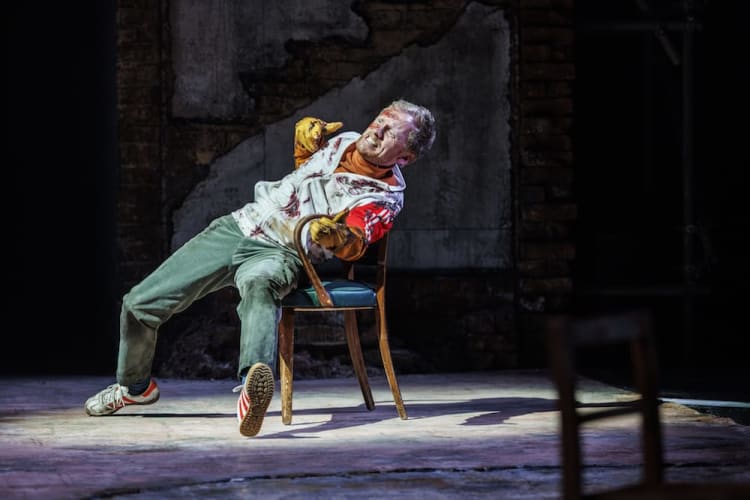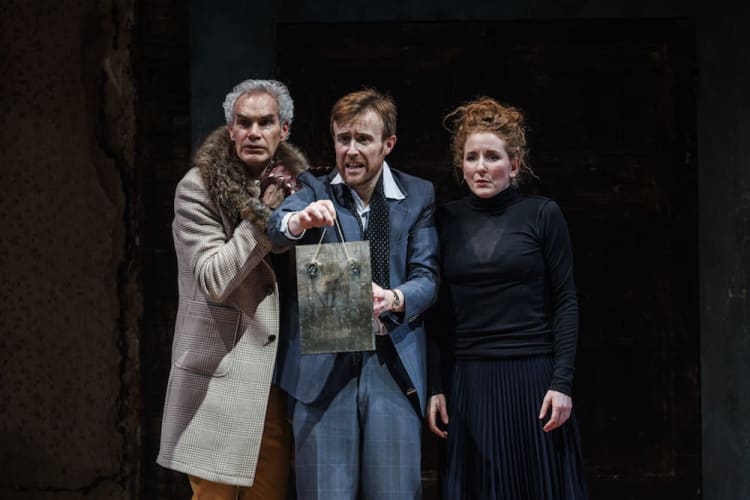Nachtland, night space, possibly interpreted as the dark cloud of history, or dark human nature, or both, one the legacy of the other. It’s a scathing satire, which sugars the pill, but the timely dialogues are accusatory, angry, devious, as the past informs the present. Little new there, but its convenient fiction engages me because of Patrick Marber’s fine production.
Siblings Nicola (Dorothea Myer-Bennett) and Philipp (John Heffernan) are emptying their late father’s house (looks pretty rickety, more of a barn, in Anna Fleischle’s design). It’s the backcloth to a bare stage littered with junk, which the cast are clearing up before the play proper starts.
They find a small painting wrapped in brown paper. Frame by Samuel Morgenstern (Jewish name), a “sepia and brown” painting by “A dot Hiller” or it could be Hitler. That throws the cat amongst the pigeons. Philipp’s wife Judith is Jewish. Nicola’s husband Fabian cuts his thumb opening the frame and succumbs to “tinnitus”… no, to “tetanus”. Gunnar Cauthery decline is a bit of physical comedy distraction.
Judith (Jenna Augen), described by Nicola as “biographically prejudiced”, wants to burn it, after all the Nazis burned her people, but they burned art, too. The siblings want to make money from it, buy a house maybe. Philipp tries to placate Judith with a charity, maybe Jewish, donation. A specialist is called in, “Dr Evamaria Günther… granddaughter of Dr Alfred Günther… responsible for collecting and cataloguing Adolf Hitler’s paintings in the NSDAP archive”. Jane Horrocks plays her up to the parodic hilt.
Evamaria finds a buyer, but they need provenance. This is where the skeletons come tumbling out of the closet: the siblings’ grandmother Grete was a party member, but then everyone was in the thirties. She had an affair with Martin Bormann, Hitler’s private secretary. “All Nazis were romantics.” They find letters in the bin to prove it. The price goes up. The buyer, a rich louche decadent, Kahl (means bald), played with agile delight by beautifully coiffed Angus Wright (I see his devilish Koroviev in Complicite’s Master and Margarita), wants it, weeps when he sees it, and to prove he is not a racist makes a pass at Judith.
The Jewish question rages, with Kahl listing the famous men from centuries past who were anti-Semites, some you’ll know, some will surprise, the list is historically long and international. Voltaire apparently thought “‘the Jewish nation’” “‘the most contemptible the world has ever seen’”. This is dynamite.
And so it goes, the civilised veneer is very thin. As we know, post WW2, many Nazis slipped quietly out of the limelight. Their DNA and influence remains even when families have married out. But can’t we separate the art from the artist or the regime? Whom do we cancel? It’s a glaring issue of today in several global spheres.
This is the “smoke and mirrors” moral dilemma Marius von Mayenburg’s Nachtland delivers with direct address to the audience. There are some zingers, especially in Evamaria’s caricature German, channeling AfD perhaps: “where would we be if we accuse everyone who admires Hitler of being a Nazi?” Judith counters with “today’s anti-Semitism against Israel wouldn't exist without Nazi Germany. It was a Germanic export hit”.
And so on. The family falls apart. The ring Philipp gave Judith, his grandmother Grete’s is inscribed with MB—for Margarete and her first husband Bruno—or a gift from Martin Bormann—is now tainted (Gift in German means poison). Judith gives it back. Philipp gives it to his sister as they succumb to incestuous masturbation (there is an intimacy director), whilst Judith is locked in the bathroom.
A bad move—she does a Bansky or a Chapman brothers on the painting. The Jewish frame is still OK—Hitler did not save his framer from his Juden fate—but his frame survives. And then… spoiler alert… Luise arrives. Luise was the last word on the father’s lips. We are primed for this in the first few minutes, but don't absorb it. Like Gogol’s government inspector, the mysterious real owner arrives.
Gogol, Bulgakov, Brecht—the clues are there: in the text and subtext, in Marber’s subtle pacing, in the Adam Cork’s music score and sound design. Nachtland, which premièred at the Schaubühne December 2022, plays for 1 hour 40 minutes with no interval on a thrust stage.
A mix of naturalism and magic realism, the actors are excellent, even poor Gunnar Cauthery, who is an expedient device. His wife forgets about him, as he vanishes off the scene. Metaphors, political, philosophical and personal…
No hard programmes, but you can buy the text. And here is the online warning for the delicate: “this show contains themes of racism; themes and instances of antisemitism; references to the Holocaust; references to the Israel-Palestine conflict and history; references to Nazi influence in Israel and Palestine; references to the death of a parent; description of injury and moments where blood is onstage; strong language including explicit sexual language; sexual content, including partial nudity, masturbation, and scenes involving incest; Nazi gestures including Nazi salutes; brief allusions to non-consent / rape; sexism.” And more… will this attract or detract?
